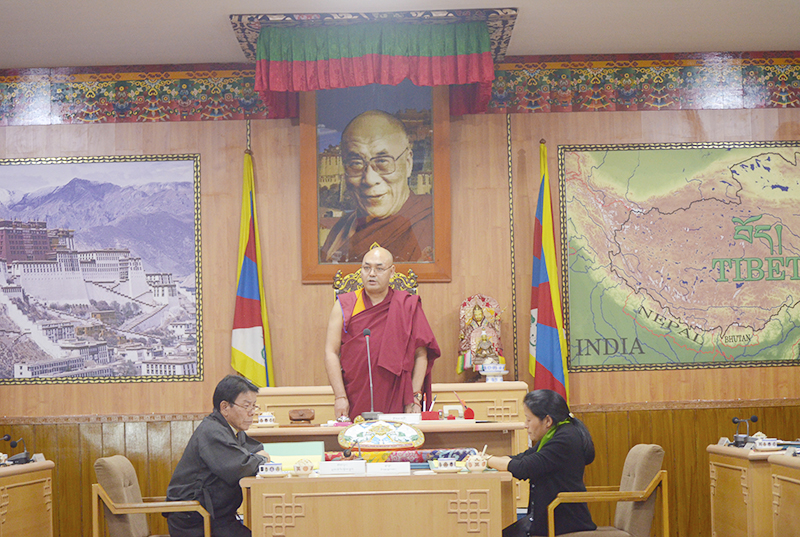 Dharamshala — The final day of the fourth session of the 16th Tibetan Parliament-in-Exile concluded on September 28th, presided over by Speaker Ven. Khenpo Sonam Tenphel.
Dharamshala — The final day of the fourth session of the 16th Tibetan Parliament-in-Exile concluded on September 28th, presided over by Speaker Ven. Khenpo Sonam Tenphel.
The General session for the fiscal year 2017-18 of the Tibetan Parliament in Exile concluded after nine days of deliberations and discussions on the activities of the seven departments of the Central Tibetan Administration, and the situation inside Tibet.
The Hall, assembled with Speaker of the Tibetan Parliament-in-Exile and its Deputy Speaker, President of the Central Tibetan Administration along with his cabinet of ministers, as well as the parliamentarians, sang the Tibetan national anthem.
The 4th session of the 16th Tibetan Parliament-in-Exile concluded with Speaker Ven. Khenpo Sonam Tenphel addressing the members, in particular referring to the resolution to implement Tibetan language as primary medium in every official correspondence and program at both Central and local level as momentous.
In his concluding remarks, Speaker Khenpo Sonam Tenphel expressed appreciation in the high level of discussions and participation of the parliamentarians during the proceedings.
“Tibetan language is being pushed to the fringes under the Chinese government’s unjust policies in Tibet. In exile, due to circumstances beyond our control, Tibetan language is deteriorating. Therefore, we should make extra efforts to retain the rich linguistic culture of Tibet.” At the same time, he welcomed the renewed interest in Tibetan language and culture among Tibetans residing in the west.
"The current situation inside Tibet is grim but changes are inevitable. I remains hopeful that societal as well as political developments are on the horizon in China.
"Recently, Chinese foreign minister Wang Yi’s recent address in the United Nations called for dialogue to resolve the nuclear crisis between the US and North Korea. In that light, China should also consider resolving the Tibet issue based on the mutually beneficial Middle Way Approach."
“It is very difficult for the Chinese government to avoid the Tibet issue for long due to factors such as spirit of Tibetan inside Tibet and the dedication of Tibetans in exile under His Holiness and the exile administration. Moreover, concerns shown by the international community will compel China to address the issue,” said the Speaker in his concluding speech at the Parliament in Gangchen Kyishong.
President of Central Tibetan Administration Dr Lobsang Sangay also addressed the parliament this session, responding to questions and concerns raised by members over the Kashag’s decision to observe Tibetan Women’s Day on March 12.
The President said, "the responsibility of commemorating Tibetan Women’s Uprising Day rests on the six million Tibetans and should not be just relegated to as an undertaking of Tibetan Women Association alone.
"The CTA’s decision to observe the 12th of March as Tibetan Women’s Day is premised on the faith that this historic decision will engender the commemoration of the sacrifices of Tibetan women in Tibet’s history and and in a bid to garner mass participation on the Uprising day.
"Tibetan Women’s Day is a platform to support and strengthen the empowerment of Tibetan women as well as a platform to commemorate and communicate the historical significance of the Tibetan Women’s Uprising day"
Further speaking on women’s empowerment, Dr Sangay affirmed that CTA strongly abides by the Tibetan charter that advocates the principles of gender equality, however, he added that due to the mindset of certain individuals in the public, gender discrimination do exist.


![Tibet has a rich history as a sovereign nation until the 1950s when it was invaded by China. [Photo: File]](/images/stories/Pics-2024/March/Tibet-Nation-1940s.jpg#joomlaImage://local-images/stories/Pics-2024/March/Tibet-Nation-1940s.jpg?width=1489&height=878)















